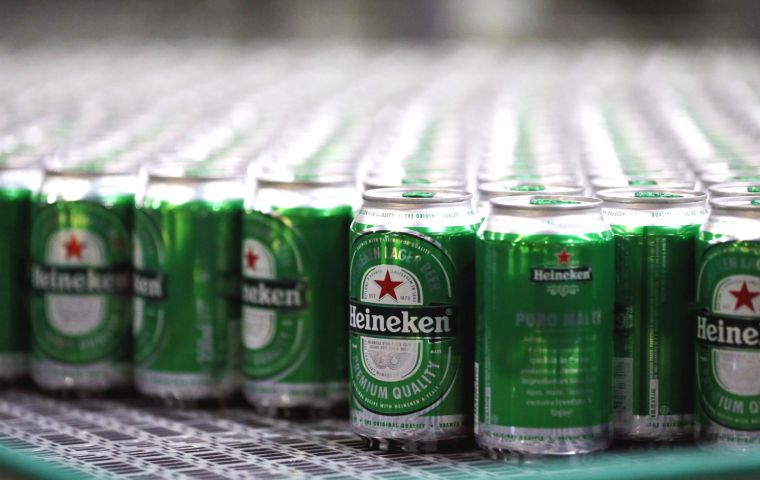MercoPress. South Atlantic News Agency
Brazil: Breweries fined heavily for employing undocumented Venezuelan migrants whom they deprived of basic rights
 Under Brazilian law, Heineken and Ambev are accountable for the doings of the outsourced contractor (Sider)
Under Brazilian law, Heineken and Ambev are accountable for the doings of the outsourced contractor (Sider)  The migrants lived for months (some more than a year) in the cab of the trucks parked at Sider's headquarters in Limeira and Jacareí
The migrants lived for months (some more than a year) in the cab of the trucks parked at Sider's headquarters in Limeira and Jacareí The breweries Ambev and Heineken have been fined heavily in Brazil for the illegal employment in slavery-like conditions of Venezuelan migrants, who will now receive about R $ 657,270 (the US $ 125,000) in compensation.
A total of 22 Venezuelan migrants and one Haitian were freed in March 2021 in an operation of the Slave Labor Eradication Program in the state of São Paulo after discovering they had been working in subhuman conditions for the firm Sider, a transport subcontractor of Ambev and Heneiken, who have now to pay damages money to the victims.
The migrants lived for months (some more than a year) in the cab of the trucks parked at Sider's headquarters in Limeira and Jacareí, cities in the interior of São Paulo. They worked long hours and no days off. In addition, they did not have access to drinking water, it was reported.
The workers also had to pay for the work uniform, for nationalizing their driving license and for the unforeseen events suffered by the vehicle assigned to them.
Under Brazilian law, Heineken and Ambev are accountable for the doings of the outsourced contractor (Sider). Both brewers were found to act with deliberate blindness by ignoring the proper verification of compliance with the laws by the transport company, to obtain benefits to the detriment of labour protection regulations.
“The strenuous working day and the degrading conditions due to not having accommodation, for example, are conditions that the contractor [Ambev and the Heineken Group] should have controlled,” said labour inspector Lívia dos Santos Ferreira in a report.
“The Heineken Group failed to choose and hire Sider as a transportation service provider, by not inspecting or requiring that the contractor complied with labour laws and, finally, by failing to guarantee directly the hygiene, health and safety conditions of the rescued workers,” the report went on.
One of the Venezuelan victims explained to Spanish newspaper El País that when workers complained about the abusive treatment, supervisors simply told them to return to their country. «It was a very difficult time. They treated us like dogs, like animals. I lived for 11 months in my truck, in a space where I could only lie down and sleep, nothing more,” he said.
The Heineken Group claimed in a statement it learned of the case through the Regional Labor Superintendency, and that it actively collaborated to guarantee all the fundamental rights of workers, as indicated by the authorities.
The company also said that all suppliers undergo a rigorous selection process and sign a code of conduct in which they commit to fully comply with labour and human rights laws.
Ambev stated that as soon as they learned of the situation, they immediately made sure that the drivers were transferred to a hotel, where they were given shelter and received the necessary support.
«Following the guidelines and with the agreement of the labour inspectors, we ensure the payment of all labour compensation and that the transport company will facilitate the return of the drivers to their place of origin or bring their families, according to the choice of each one”.
The monthly remuneration of these workers varied between 1,900 and 4,000 reais (between 360 and 750 dollars); However, the worker only reached the maximum wage when he was subjected to all these violations, living in the cab of the truck and without days off.
Sider offered workers the possibility to sell their days off, which is not illegal. But with nowhere to go, because the company did not offer them accommodation, and desperate to save money to help their families at home, many accepted the proposal.
In their report, inspectors found that this practice constituted an abuse of the vulnerability of the immigrant worker.




Top Comments
Disclaimer & comment rulesCommenting for this story is now closed.
If you have a Facebook account, become a fan and comment on our Facebook Page!